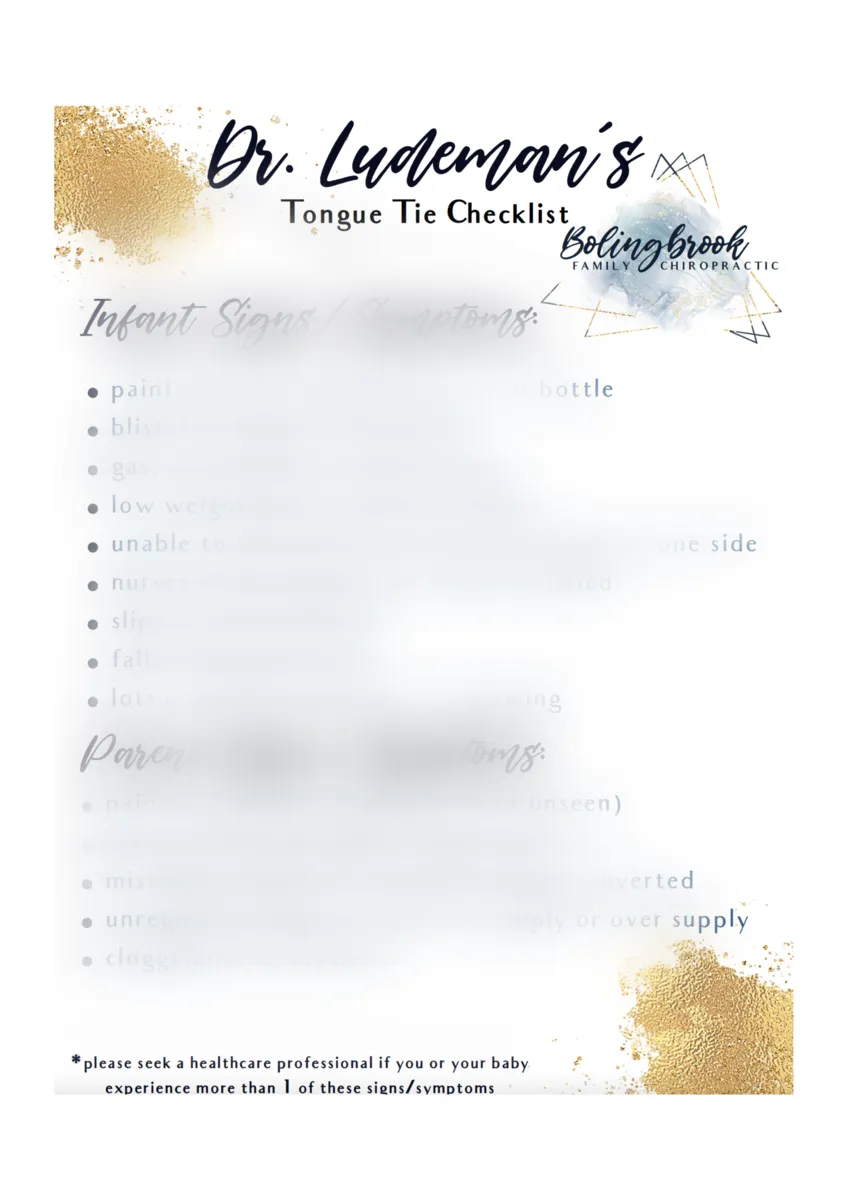Building a Strong Foundation
Chiropractic is a safe, healthy and gentle health care option for your child. We love seeing kids and know that we can create positive change in your entire family’s life by helping your child. You can rest assured that they’ll learn to love their visits with us.
Our office is kiddo approved! If your child is about toddler age or up, we’ll show them around, let them move the table up and down and introduce them to the Activator adjusting instrument. If your baby is coming in as a patient, we’ll have you lie on the adjusting table with them resting comfortably on you.
Our providers have personal experience in assisting children with special needs and are comfortable with kids experiencing learning, social and behavioral challenges.
Meet Our Pediatric Chiropractic Specialists:
Dr. Bandemer & Dr. Ludeman
Healthy Adults Grow from Healthy Children
Did you know that the majority of your nervous system develops within the first few years of your life? Chiropractic care helps facilitate a strong, healthy foundation for your child's nervous system and overall development. A healthy childhood is filled with growth, adventures and usually a few bumps along the way. Our providers are here to support your child as they navigate their early years.
We welcome and encourage you to bring your baby in as soon as you’re able to after delivery. Most of our parents bring their babies and children in for regular wellness checks, but sometimes there may be an issue that needs more frequent care. No matter the reason, your child will be in caring hands with our doctors.
Common Issues Seen In Our Office
Spinal Misalignments
A baby can experience shifts in their spine very early on in life, oftentimes during the normal birthing process. This may cause stress and interference to the nervous system which often presents with other symptoms like latch issues, colic, constipation or general fussiness. You may also notice a preference for the head to turn or tilt to one side or misshapen head.
Constipation
Pressure or inflammation on the spinal nerves that control our gut motility can be caused by shifts in the spine. This can cause gas, bloating and constipation in all humans, but especially babies as their pelvic bones mature. We've had more than a few babies experience a blowout situation after a gentle chiropractic adjustment.
Colic
Colic is prolonged crying and general fussiness in an otherwise healthy baby. This can be due to any number of things. We have seen tired, frustrated parent come in with inconsolable babies that leave our office content and happy.
Breastfeeding/
Latching
A baby may have a tongue tie or latch issue that can improve with chiropractic care and other natural protocols. Sometimes, we see babies who have a preference for feeding or latching on one side and struggle with the other. Our providers have experience other healthcare professionals to address breastfeeding and latch issues.
Ear Infections
Our ear canal starts in a horizontal direction that gradually shifts to be more vertical as we age. This means that baby ear canals have to rely more on the inner ear muscles to drain fluid properly. If the muscles are receiving improper communication from the nerves due to spinal irritation, it can lead to stagnant fluid and recurrent ear infections. Chiropractic care can restore this communication and ensure proper drainage of the ear.
Fine Motor Skills
Your baby's brain goes through massive growth in the first few years of life. Part of this growth encourages the development of fine motor skills. If you are noticing delays in their ability to grip, crawl, or movement patterns we can work with you to find a natural solution. Our providers are certified in Dynamic Neuromuscular Stabilization which addresses these issues.
Download Our Free Checklist
Natural Care for Lip & Tongue-ties
What is a tongue-tie?
The lingual frenulum (or frenum), is a remnant of tissue in the mid-line between the undersurface of the tongue and the floor of the mouth. When it interferes with normal tongue function it is called “symptomatic tongue-tie” or “symptomatic ankyloglossia”. Tongue-tie can adversely affect breastfeeding.
Should a tongue-tie always be treated?
The negative impact of tongue-tie varies from patient to patient. For some, the impact is very minor while for others the impact is substantial. However, it is impossible to predict which babies will experience the worst problems as they grow up (Dr. Ludeman would know! She had one child released at 6 weeks and another at 11 months). Treatment is recommended only in symptomatic individuals. Symptomatic tongue tie can be treated at all ages after symptoms begin to appear.
How do I identify a tongue-tie?
A tongue-tie may not be obvious at birth. You should consult with a practitioner who specializes in tongue-ties if your baby has breastfeeding problems or if you have pain with latching, or damaged or bleeding nipples. Other indications that warrant a discussion with a tongue-tie specialists include difficulties with swallowing, speech articulation, and/or tooth misalignment or dental problems. Our providers have experience working alongside other healthcare providers to come up with the best treatment option for your little one.
What kinds of problems do tongue-ties cause?
In infants (0-12 months), tongue-tie can impair their sucking and swallowing at the breast. Babies can have minor to severe difficulty coordinating their sucking, swallowing, and breathing. Symptoms can include latch difficulties, damaged or painful nipples, “colic” like behavior, constipation, compromised milk supply, poor milk transfer, low weight gain, and failure to thrive. Children (1+) who are tongue-tied may present with speech articulation problems, childhood sleep apnea, ADHD, swallowing problems and increased incidence of dental problems.
Will the tongue-tie worsen after treatment?
Research demonstrates that tongue-tie release procedures are safe and side effects are rare. Sometimes, the tongue becomes less mobile due to scar tissue a few days to weeks after the frenectomy. Support from a tongue-tie professional such as chiropractor, IBCLC, speech pathologist, or myofunctional therapist will optimize function. Scar tissue formation may be present, which may resolve with proper wound care and post-procedure exercises given by your doctor or specialist.
Building a Strong Foundation
Chiropractic is a safe, healthy and gentle health care option for your child. We love seeing kids and know that we can create positive change in your entire family’s life by helping your child. You can rest assured that they’ll learn to love their visits with us.
Our office is kiddo approved! If your child is about toddler age or up, we’ll show them around, let them move the table up and down and introduce them to the Activator adjusting instrument. If your baby is coming in as a patient, we’ll have you lie on the adjusting table with them resting comfortably on you.
Our providers have personal experience in assisting children with special needs and are comfortable with kids experiencing learning, social and behavioral challenges.
Meet Our Pediatric Chiropractic Specialists:
Dr. Bandemer & Dr. Ludeman
Healthy Adults Grow from Healthy Children
Did you know that the majority of your nervous system develops within the first few years of your life? Chiropractic care helps facilitate a strong, healthy foundation for your child's nervous system and overall development. A healthy childhood is filled with growth, adventures and usually a few bumps along the way. Our providers are here to support your child as they navigate their early years.
We welcome and encourage you to bring your baby in as soon as you’re able to after delivery. Most of our parents bring their babies and children in for regular wellness checks, but sometimes there may be an issue that needs more frequent care. No matter the reason, your child will be in caring hands with our doctors.
Common Issues Seen In Our Office
Spinal Misalignments
A baby can experience shifts in their spine very early on in life, oftentimes during the normal birthing process. This may cause stress and interference to the nervous system which often presents with other symptoms like latch issues, colic, constipation or general fussiness. You may also notice a preference for the head to turn or tilt to one side or misshapen head.
Constipation
Pressure or inflammation on the spinal nerves that control our gut motility can be caused by shifts in the spine. This can cause gas, bloating and constipation in all humans, but especially babies as their pelvic bones mature. We've had more than a few babies experience a blowout situation after a gentle chiropractic adjustment.
Colic
Colic is prolonged crying and general fussiness in an otherwise healthy baby. This can be due to any number of things. We have seen tired, frustrated parent come in with inconsolable babies that leave our office content and happy.
Breastfeeding/
Latching
A baby may have a tongue tie or latch issue that can improve with chiropractic care and other natural protocols. Sometimes, we see babies who have a preference for feeding or latching on one side and struggle with the other. Our providers have experience other healthcare professionals to address breastfeeding and latch issues.
Ear Infections
Our ear canal starts in a horizontal direction that gradually shifts to be more vertical as we age. This means that baby ear canals have to rely more on the inner ear muscles to drain fluid properly. If the muscles are receiving improper communication from the nerves due to spinal irritation, it can lead to stagnant fluid and recurrent ear infections. Chiropractic care can restore this communication and ensure proper drainage of the ear.
Fine Motor Skills
Your baby's brain goes through massive growth in the first few years of life. Part of this growth encourages the development of fine motor skills. If you are noticing delays in their ability to grip, crawl, or movement patterns we can work with you to find a natural solution. Our providers are certified in Dynamic Neuromuscular Stabilization which addresses these issues.
Natural Care for Lip & Tongue-ties
Common FAQs
What is a tongue-tie?
The lingual frenulum (or frenum), is a remnant of tissue in the mid-line between the undersurface of the tongue and the floor of the mouth. When it interferes with normal tongue function it is called “symptomatic tongue-tie” or “symptomatic ankyloglossia”. Tongue-tie can adversely affect breastfeeding.
Should a tongue-tie always be treated?
The negative impact of tongue-tie varies from patient to patient. For some, the impact is very minor while for others the impact is substantial. However, it is impossible to predict which babies will experience the worst problems as they grow up (Dr. Ludeman would know! She had one child released at 6 weeks and another at 11 months). Treatment is recommended only in symptomatic individuals. Symptomatic tongue tie can be treated at all ages after symptoms begin to appear.
How do I identify a tongue-tie?
A tongue-tie may not be obvious at birth. You should consult with a practitioner who specializes in tongue-ties if your baby has breastfeeding problems or if you have pain with latching, or damaged or bleeding nipples. Other indications that warrant a discussion with a tongue-tie specialists include difficulties with swallowing, speech articulation, and/or tooth misalignment or dental problems. Our providers have experience working alongside other healthcare providers to come up with the best treatment option for your little one.
What kinds of problems do tongue-ties cause?
In infants (0-12 months), tongue-tie can impair their sucking and swallowing at the breast. Babies can have minor to severe difficulty coordinating their sucking, swallowing, and breathing. Symptoms can include latch difficulties, damaged or painful nipples, “colic” like behavior, constipation, compromised milk supply, poor milk transfer, low weight gain, and failure to thrive. Children (1+) who are tongue-tied may present with speech articulation problems, childhood sleep apnea, ADHD, swallowing problems and increased incidence of dental problems.
Will the tongue-tie worsen after treatment?
Research demonstrates that tongue-tie release procedures are safe and side effects are rare. Sometimes, the tongue becomes less mobile due to scar tissue a few days to weeks after the frenectomy. Support from a tongue-tie professional such as chiropractor, IBCLC, speech pathologist, or myofunctional therapist will optimize function. Scar tissue formation may be present, which may resolve with proper wound care and post-procedure exercises given by your doctor or specialist.
Download Our Free Checklist
Client Love
Dr. Ludeman has a deep knowledge for women’s and infant’s/children’s health. She is very compassionate, always listening to her patients’ needs. She is always learning new techniques and approaches, staying up to date.


